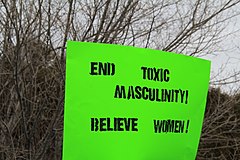There are many misconceptions that surround the phrase “toxic masculinity.” I do not mean that there are toxic substances oozing out of men, or that men are overall evil. No, toxic masculinity comes from the pressures we place on men as a society.
Watch any Old Spice commercial and you will find incredibly fit men who are incapable of smelling like anything besides pine, wood, or “noir” (the French word for “black”). Culture gives men rigid categories to fit into in order to claim their manhood. Men must be strong (both physically and mentally), smart, hardworking and emotionally stagnant. Not to say that these qualities are bad, but they are limiting.
Men are taught through their parents and through socialization that if they want to keep their manhood they must not stray outside of their designated gender roles. A study on “The Effects of Gender Socialization on Men and Women” from Penn State University discusses this cultural norm.
“The United States is cultured into socializing men to be masculine and hide their feelings, while women are encouraged to express themselves and be the nurturing care-takers,” the study says. “Gender socialization begins at a young age and affects physical health for men and women.” From an early age, boys begin policing one anothers’ masculinity. They will exclude their peers who like “girly” toys, games, clothing and hairstyles.
Women have made a way for themselves to be able to exhibit traditionally masculine clothing and characteristics. While there are still inequalities that women face, the feminist movement made it possible for women to gain a broader sense of “femininity” beyond how they look. Yet men will rarely venture into expressing more traditionally feminine traits.
Why are men afraid to admit that they are not and cannot always be strong? Why can men not be vulnerable and allow themselves to be emotive? Men are not psychopaths who do not require emotional closeness with people. Our culture teaches young men to numb their emotions through hurtful phrases like “man up” and “stop being a sissy.” This kind of speech equates showing emotion to weakness. Experiencing and listening to your emotions is an incredibly difficult task. Gaining the courage to confront and work through emotions in a healthy way is not weak; it is quite the opposite.
The violent tendencies we have socialized men into believing they need is plaguing our society. Men do not come out of the womb trying to wrestle nurses; they come into the world as we all do: crying. The difference is that we teach men to hide their emotions. As a result of this suppression, “young men ages 20-24 are seven times more likely to die from suicide than women of the same age,” according to the Gateway to Mental Health Services. According to Statista, “Since 1982, an astonishing 111 mass shootings have been carried out in the United States by male shooters. In contrast, only three mass shootings have been carried out by women.” Why do you think this is? Young men find themselves desperate to reclaim their masculinity because they have been labeled outcasts. They resort to what they were told makes a man a man: the appearance of strength through violence.
Toxic masculinity is killing men and women alike. Just look at rape statistics in the U.S. RAINN, America’s largest anti-sexual violence organization reports “82% of all juvenile victims are female. 90% of adult rape victims are female.” I do not want to ignore the fact that there are men who are abused by women, but the overwhelming amount of gender-based violence is acted out by men toward women. The structures we have created teach men that they have to be sexually dominant, closed off and show no signs of weakness.
Instead of buying into the rules we are given by society on what it means to be feminine and masculine, we should be able to look at ourselves and see our interests, likes and dislikes, and not allow gendered pressures to force us into leaving our passions behind. We should be asking the hard questions. We need advocates for men and women alike, to promote the importance of mental health and emotional vulnerability for all.




